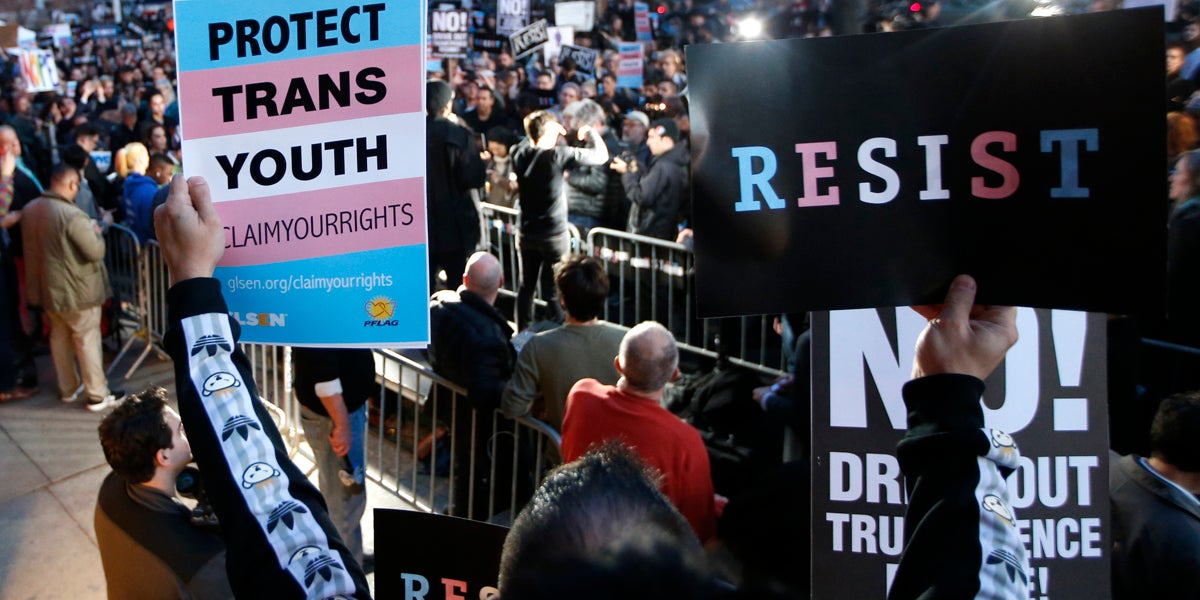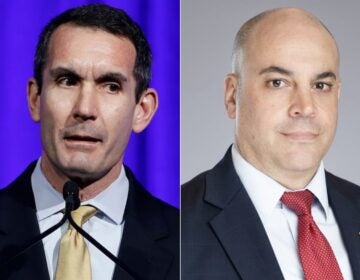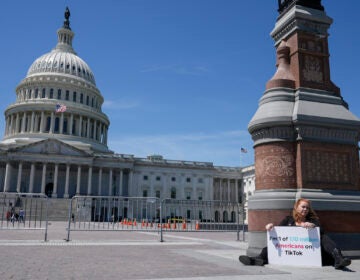What does Trump transgender bathroom policy mean for Pa. school districts? Not much (yet)
Listen
A participant holds signs from a stoop next door to the Stonewall National Monument during a rally in support of transgender youth Thursday in New York. Supporters spoke out against President Donald Trump's decision to roll back a federal rule saying public schools had to allow transgender students to use the bathrooms and locker rooms of their chosen gender identity. (AP Photo/Kathy Willens)
Last spring, the Obama administration told school districts to allow transgender students to use the bathroom and locker room of their choice. Late Wednesday, the Trump administration rescinded that guidance.
It’s a move charged with symbolic importance. But what does it actually signify for local school districts?
For now, it doesn’t mean much.
Take the case of Philadelphia. In June, the district’s School Reform Commission passed an omnibus policy on the rights of transgender students that, among other things, allows them to use the bathroom that corresponds to their gender identity and the gender pronoun they prefer. That policy still stands and will continue to stand.
“We’re proud of that policy and glad that we can provide what we think are very safe and supportive environments for all children,” said Superintendent William Hite.
Of Pennsylvania’s 500 school districts, somewhere between 15 and 30 have policies similar to Philadelphia’s, said Emily Leader, member services counsel for the Pennsylvania School Boards Association. In other words, a small fraction of Pennsylvania districts have policies that specifically allow transgender students to use their bathroom of choice.
Nothing about Wednesday’s letter from the federal Departments of Education and Justice requires those districts to change their rules. In fact, the Trump administration said it’s empowering states and local school districts to make their own judgments on the issue of transgender bathroom access.
That means school districts such as Philadelphia’s can proceed as they were. And it appears they will.
In absence of law, sticking with policy
Two other local school districts with similar policies to Philadelphia — Lower Merion and Great Valley — said they plan to stand pat.
“Our commitment is steadfast … hopefully folks in our community realize that’s the case,” said Doug Young, director of school and community relations for the Lower Merion School District.
But just as Lower Merion can stand pat, so too can the Pine-Richland School District outside Pittsburgh.
Pine-Richland is, to Leader’s knowledge, the only school district in Pennsylvania that requires students to use the bathroom that corresponds with their biological sex. A transgender student has sued the district, saying its policy violates the equal protection clause of the U.S. Constitution and Title IX.
That case is currently before the U.S. District Court in Pittsburgh. The U.S. Supreme Court, meanwhile, is reviewing a similar case out of Virginia. How the courts decide in these and other cases will likely have far more direct influence on what local school districts do than the Trump administration’s recent change in federal guidance.
“The law is unsettled,” said Leader. “We don’t know which way it will end up. And, between the Supreme Court case and the Pennsylvania case, we should have more clarity about what to tell our members the law says in the next few months.”
In the interim there could be some fallout for transgender students who live in districts such as Pine-Richland or in districts without specific bathroom-use policies. In those districts, if transgender students are denied access to the bathroom of their choice, they could not file complaints with the U.S. Department of Education and expect the department to consider those complaints actionable under federal gender equity laws.
“That student, through that administrative complaint process, won’t be able to get assistance from the Department of Education investigating that issue,” said Leader.
The Trump administration’s guidance change also means the federal government likely won’t file friendly briefs for transgender students who sue local school districts. Similarly, if the courts default to the federal government’s enforcement protocol, that default ruling won’t protect transgender students in districts such as Pine-Richland.
The broader significance
Then there are the political and social implications of Wednesday’s move.
Leader noted, for instance, that the guidance from the Obama administration was accompanied by a “flurry” of school districts passing their own transgender bathroom policies. That flurry could now subside.
Wednesday’s news is also a psychological setback for LGBTQ advocates.
“We may not gain any more ground in these next few years, but we can fight as hard as we can to make sure we don’t lose any ground,” said Deja Lynn Alvarez, director of the LGBTQ Home of Hope.
Right now in Pennsylvania, the issue of school bathroom use is left entirely to school districts because the commonwealth has no law on the matter. On Thursday, the state Department of Education said it’s still examining the Trump administration’s recent action.
“The Department is reviewing the guidance and is working closely with the Wolf administration to ensure the protection of all students in schools across the commonwealth, no matter their race, sexual orientation, gender identity or expression,” according to its statement.
“Governor Wolf is committed to ensuring Pennsylvania remains a place where everyone feels welcome, and those protections must extend to our classrooms and schools.”
WHYY is your source for fact-based, in-depth journalism and information. As a nonprofit organization, we rely on financial support from readers like you. Please give today.





